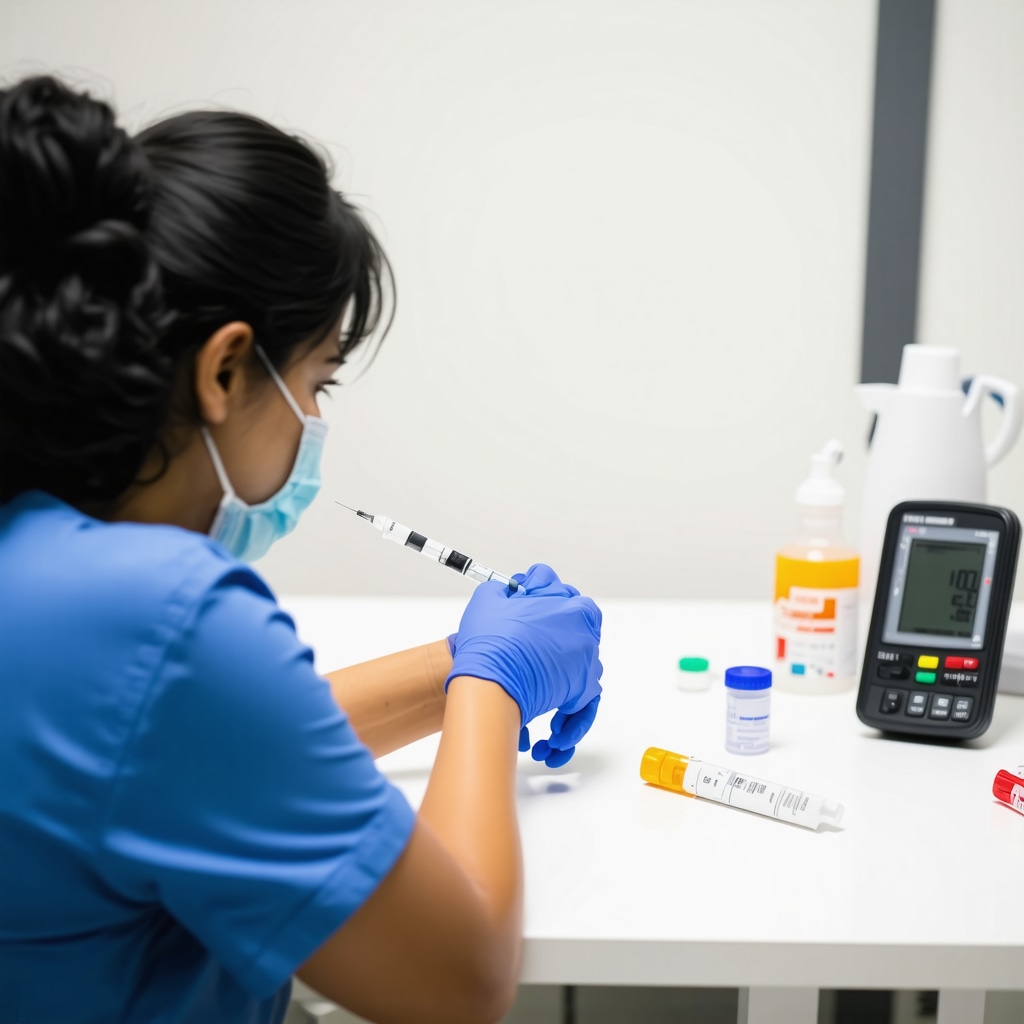Strategic Foundations of Weekly Tirzepatide Dosing in Mounjaro Treatments NJ
In the evolving landscape of obesity medicine, Mounjaro treatments leveraging tirzepatide have emerged as a transformative intervention for weight management in New Jersey. Tirzepatide, a dual glucose-dependent insulinotropic polypeptide (GIP) and glucagon-like peptide-1 (GLP-1) receptor agonist, capitalizes on intricate hormonal pathways to induce substantial fat loss and metabolic improvements. Administering tirzepatide on a weekly basis optimizes patient adherence and pharmacokinetics, but achieving maximal efficacy demands nuanced dosing strategies tailored to individual physiology and clinical profiles.
Pharmacodynamic Insights Underpinning Tirzepatide Weekly Injection Protocols
Understanding tirzepatide’s unique mechanism—simultaneous GIP and GLP-1 receptor activation—illuminates why weekly dosing regimens in NJ clinics synchronize with its prolonged half-life and receptor engagement dynamics. This therapeutic cadence not only sustains glycemic control but also modulates appetite and energy expenditure. Expert physicians emphasize titration schedules commencing at lower doses to mitigate gastrointestinal adverse events, progressively escalating to maintenance doses that balance efficacy and tolerability, as outlined in the Mounjaro expert guide.
How Do Weekly Tirzepatide Dosing Adjustments Influence Patient Outcomes in NJ?
Clinician forums and recent studies highlight that personalized dose adjustments, informed by weight loss trajectories and side effect profiles, significantly enhance sustained fat loss and metabolic benefits. The iterative assessment enables NJ obesity medicine specialists to preempt adverse effects such as nausea or hypoglycemia while optimizing dose intensity. Moreover, integrating tirzepatide therapy with lifestyle interventions amplifies durability of weight management outcomes, as corroborated by clinical trials published in the New England Journal of Medicine.
Advanced Clinical Considerations: Patient Selection and Monitoring in Tirzepatide Use
Expert practitioners in New Jersey underscore the importance of comprehensive patient evaluation including metabolic status, comorbid conditions, and medication history before initiating weekly tirzepatide. Continuous monitoring through scheduled consultations ensures dose optimization and early detection of complications. This precision medicine approach aligns with recommendations from NJ physician-supervised weight loss programs, enhancing both safety and efficacy.
Leveraging NJ-Based Expertise to Maximize Tirzepatide’s Therapeutic Window
Clinicians in New Jersey are pioneering protocols that integrate weekly dosing with patient-centric educational initiatives and adherence support, driving superior outcomes in Mounjaro treatments. These programs focus on realistic goal setting, side effect management, and behavioral reinforcement to sustain long-term fat loss.
Explore more advanced insights and professional guidance on optimizing your tirzepatide journey by visiting our detailed resource on weekly tirzepatide treatments in NJ.
Incorporating Continuous Patient Feedback into Tirzepatide Titration Protocols
In New Jersey’s clinical environment, leveraging real-time patient feedback is pivotal for refining weekly tirzepatide dosing. This patient-centered approach facilitates dynamic dose titration based on individual tolerance and metabolic response. Physicians employ digital health tools and telemedicine consultations to monitor gastrointestinal side effects, glycemic metrics, and weight loss patterns, enabling timely adjustments that sustain therapeutic momentum without compromising safety. This methodology aligns with the latest clinical protocols found in NJ expert weight loss consultations, which underscore personalization as the cornerstone of long-term success.
Synergistic Effects of Tirzepatide with Lifestyle Modifications in NJ Programs
Integrating structured nutrition and physical activity regimens amplifies tirzepatide’s efficacy. NJ obesity medicine specialists advocate for comprehensive programs combining weekly injections with behavioral coaching aimed at sustainable lifestyle shifts. The dual action of tirzepatide not only targets appetite regulation but also enhances insulin sensitivity, creating a metabolic milieu favorable for fat oxidation. This synergy is crucial for patients aiming for durable outcomes beyond pharmacotherapy alone, as emphasized in the comparative analyses published by the National Institutes of Health.
What Are the Critical Biomarkers to Monitor During Weekly Tirzepatide Therapy for Optimal Weight Loss in NJ?
Expert endocrinologists and obesity medicine practitioners in NJ focus on a panel of biomarkers including fasting glucose, HbA1c, lipid profiles, and inflammatory markers to gauge therapeutic response and adjust dosing. Continuous glucose monitoring (CGM) technology further refines dose titration by providing granular glycemic data, optimizing metabolic control while minimizing hypoglycemia risk. Additionally, tracking changes in body composition via DXA scans or bioelectrical impedance adds depth to assessing fat loss versus lean mass preservation, pivotal for tailoring individualized treatment plans. These practices are integral to advanced physician-supervised programs such as those detailed in NJ physician-supervised tirzepatide care.
Addressing Common Challenges: Managing Side Effects for Sustained Treatment Adherence
Gastrointestinal symptoms remain the most reported side effects during tirzepatide initiation. NJ clinicians emphasize proactive management strategies including dose escalation pacing, dietary adjustments, and symptomatic treatments to enhance patient comfort. Education about expected transient effects fosters patient resilience and adherence. Moreover, interdisciplinary collaboration with dietitians and behavioral therapists provides holistic support, reinforcing adherence and optimizing outcomes. For detailed guidance on mitigating adverse events, refer to the expert recommendations in NJ’s expert tirzepatide safety guide.
Engage with us: Have you experienced or managed tirzepatide side effects effectively? Share your insights or questions below to support our NJ community in achieving safe and successful weight loss journeys.
Pharmacogenomic Tailoring: Unlocking Personalized Tirzepatide Dosing Paradigms in NJ
The advent of pharmacogenomics has catalyzed a paradigm shift in the personalization of tirzepatide therapy, especially within New Jersey’s advanced obesity medicine clinics. Genetic variations influencing GLP-1 and GIP receptor sensitivity, drug metabolism enzymes (notably CYP450 isoforms), and appetite regulation pathways can profoundly affect both efficacy and tolerability of weekly tirzepatide injections. By integrating genomic profiling into initial patient assessments, clinicians can anticipate differential responses and optimize starting doses accordingly, thereby mitigating adverse effects and expediting therapeutic benefits.
This approach transcends traditional one-size-fits-all dosing, moving towards precision obesity pharmacotherapy. For instance, polymorphisms in the GLP-1 receptor gene (GLP1R) have been correlated with variable weight loss outcomes and gastrointestinal side effect profiles. New Jersey-based research institutions are actively investigating these correlations to refine dosing algorithms, paving the way for genotype-guided tirzepatide regimens.
Innovative Digital Health Tools Empowering Real-Time Tirzepatide Response Monitoring
Beyond baseline pharmacogenomic insights, the real-time monitoring of tirzepatide’s metabolic impact is revolutionized through integration of wearable devices, continuous glucose monitors (CGM), and mobile health applications tailored for weight management. These platforms enable healthcare providers in NJ to capture granular data streams encompassing glycemic variability, physical activity, sleep patterns, and even dietary intake.
Machine learning algorithms process this complex data, generating predictive models that assist clinicians in dynamically adjusting weekly doses. This sophisticated feedback loop enhances patient safety by early detection of hypoglycemia risk, optimizes dose escalation pace, and identifies plateaus in fat loss to prompt adjunctive lifestyle interventions. Such digital innovations align with the precision medicine ethos, as elaborated in a recent publication in JAMA Network Open.

How Can Pharmacogenomic Data Be Effectively Integrated into Tirzepatide Dosing Protocols in Clinical Practice?
Incorporating pharmacogenomic data into clinical decision-making requires robust infrastructure and clinician expertise. NJ obesity specialists recommend a multidisciplinary framework where genetic counselors, endocrinologists, and pharmacologists collaborate to interpret genomic results within the context of comprehensive metabolic profiling. Electronic health records (EHR) equipped with clinical decision support tools can flag genetic variants relevant to tirzepatide metabolism and receptor sensitivity, facilitating evidence-based dose adjustments.
To operationalize this, initial genetic testing can be performed during patient intake, with results informing dose initiation and titration schedules. Ongoing patient monitoring then integrates phenotypic responses to refine therapy further. This model underscores the necessity of training and resource allocation but promises to significantly enhance therapeutic precision and patient outcomes in NJ’s Mounjaro programs.
Bridging Tirzepatide Pharmacology with Behavioral Economics to Enhance Adherence in NJ Patients
Adherence to weekly tirzepatide injections is paramount for sustained fat loss but is often challenged by psychological and socioeconomic factors. Applying behavioral economics principles, NJ clinicians are developing incentive-based adherence programs that leverage immediate positive reinforcement and social accountability mechanisms.
These programs incorporate personalized feedback delivered through digital platforms, framing adherence milestones as achievable goals with tangible rewards. By recognizing the interplay between neurohormonal appetite regulation via tirzepatide and patient motivation psychology, these initiatives create a synergistic environment that fosters persistent engagement with treatment regimens.
Further research into how reward sensitivity genetic variants modulate response to such interventions could refine these strategies, positioning NJ at the forefront of integrative obesity care.
Discover how these cutting-edge approaches can transform your tirzepatide treatment experience. Connect with NJ’s top obesity medicine experts to explore personalized, genomics-informed Mounjaro plans designed for maximal and safe fat loss.
Decoding Genetic Variability: The Frontier of Tirzepatide Personalization
Recent advancements in pharmacogenomics underscore the necessity to refine tirzepatide dosing beyond conventional protocols by integrating patient-specific genetic profiles. Variants in genes encoding GLP-1 and GIP receptors, along with polymorphisms in cytochrome P450 enzymes responsible for drug metabolism, can drastically modulate therapeutic outcomes and adverse event susceptibility. New Jersey-based clinical trials are pioneering genotype-phenotype correlation studies that pave the way for bespoke dosing algorithms, mitigating gastrointestinal intolerance while maximizing metabolic efficacy.
Augmenting Therapy Through Artificial Intelligence-Driven Dose Modulation
The advent of artificial intelligence (AI) facilitates unprecedented precision in weekly tirzepatide management by assimilating multidimensional patient data streams. Machine learning models analyze continuous glucose monitoring, physical activity metrics, and patient-reported outcomes to generate predictive analytics for dose optimization. This dynamic approach transcends static titration schedules, enabling clinicians to preemptively identify suboptimal responses and adjust doses in near real-time, thereby enhancing adherence and minimizing adverse effects.

What Are the Practical Steps for Clinicians to Implement Pharmacogenomic and AI Tools in Tirzepatide Dosing?
Implementing these sophisticated tools involves establishing multidisciplinary teams including geneticists, endocrinologists, data scientists, and clinical pharmacists. Clinicians should initiate comprehensive genomic screening during patient intake, integrate results into electronic health records equipped with clinical decision support systems, and employ AI platforms validated for metabolic monitoring. Continuous education and infrastructure investment are crucial for seamless integration. Collaborative frameworks, such as those outlined by the National Human Genome Research Institute, provide strategic roadmaps for adoption.
Strategic Behavioral Interventions Amplifying Pharmacological Benefits
Behavioral economics-informed strategies are transforming patient engagement by leveraging cognitive biases and reward systems to improve injection adherence. New Jersey programs are incorporating gamification, social support networks, and contingency management techniques, synergizing with tirzepatide’s neurohormonal effects to reinforce lifestyle modifications. Understanding genetic predispositions to reward sensitivity further individualizes these interventions, promising higher retention rates and sustained weight loss.
Engage directly with NJ’s leading obesity medicine specialists to unlock personalized tirzepatide protocols informed by cutting-edge genomic and AI technologies—empower your weight loss journey with precision and innovation.
Expert Insights & Advanced Considerations
Precision in Tirzepatide Titration Enhances Long-Term Outcomes
Weekly tirzepatide dosing requires meticulous individualization beyond standard protocols. Patient-specific factors such as pharmacogenomic profiles and metabolic biomarkers must guide titration schedules to balance maximal fat loss with tolerability. This precision approach reduces dropout rates and elevates sustained efficacy, a cornerstone of NJ’s leading obesity medicine clinics.
Integrating Digital Health Accelerates Responsive Dose Adjustments
The incorporation of continuous glucose monitoring and AI-driven analytics empowers clinicians to dynamically adjust tirzepatide doses in real time. This advanced monitoring identifies early signs of adverse events or plateauing weight loss, enabling proactive interventions that preserve metabolic momentum and patient adherence within NJ treatment programs.
Behavioral Economics Amplifies Pharmacotherapy Adherence
Understanding the neurobehavioral interplay of appetite regulation and motivation is critical. NJ programs that embed incentive-based adherence mechanisms, gamification, and social accountability alongside tirzepatide therapy markedly improve patient engagement, ensuring consistent weekly injections and integration of sustainable lifestyle modifications.
Pharmacogenomics as a Game-Changer in Tirzepatide Personalization
Genetic variability in GLP-1 and GIP receptor sensitivity and metabolism enzymes necessitates genotype-informed dosing to optimize response and mitigate gastrointestinal side effects. NJ’s pioneering genotype-phenotype correlation studies are setting new standards for personalized obesity pharmacotherapy with tirzepatide.
Curated Expert Resources
- New England Journal of Medicine (NEJM): Seminal clinical trials detailing tirzepatide’s efficacy and safety, essential for evidence-based protocols.
- National Human Genome Research Institute: Strategic frameworks for integrating pharmacogenomics into clinical practice, guiding NJ specialists in personalized dosing.
- JAMA Network Open: Cutting-edge research on AI applications in metabolic monitoring, informing NJ’s advanced tirzepatide dose modulation.
- WeightLossDoctorNJ.com Expert Guides: Comprehensive resources on safe weekly tirzepatide injections and physician-supervised treatment plans tailored for NJ patients.
- National Institutes of Health (NIH) Publications: Insights into synergistic effects of lifestyle interventions with tirzepatide, underpinning holistic treatment approaches.
Final Expert Perspective
Weekly tirzepatide dosing for weight loss in New Jersey represents a convergence of pharmacological innovation, precision medicine, and behavioral science. The evolving integration of pharmacogenomic insights and digital health tools into dose titration protocols exemplifies a new era of individualized therapy. Coupled with strategic behavioral interventions, these advances collectively maximize therapeutic outcomes and safety for patients pursuing sustainable fat loss.
For those committed to advancing their tirzepatide journey or clinical practice, engaging with NJ’s expert resources and specialized obesity medicine teams is indispensable. Explore more on unlocking tirzepatide weight loss secrets in NJ for 2025 or connect directly via our contact page to discuss tailored treatment pathways informed by the latest scientific and clinical advancements.


I found this post incredibly insightful, especially the detailed discussion on pharmacogenomics and digital health tools. It’s fascinating how personalized approaches are transforming obesity management in NJ. In my experience, patient education and continuous feedback play a crucial role in adherence, particularly when dealing with side effects like nausea. The integration of AI and wearable tech seems promising for real-time dose adjustments and safety monitoring. I’m curious how local clinics are training staff to interpret digital and genetic data effectively. Have any practitioners faced challenges implementing these advanced technologies, and how are they overcoming them? Overall, this comprehensive approach seems to hold great potential for long-term success. It makes me wonder, what are some common barriers patients face when starting tirzepatide therapy, and how can we best support them through these initial stages?